“The future always looks good in the golden land, because no one remembers the past.”
— Joan Didion, Slouching Towards Bethlehem: Essays
 Slouching Towards Bethlehem: Essays
Slouching Towards Bethlehem: Essays
by Joan Didion
![]()
I was at Sacramento State during the years Didion wrote the essays in “Slouching Towards Bethlehem.” By 1970, when I started grad school, her book had become a hit and everybody was reading it. Everyone but me, it seemed. Did I not want to be like everyone else? I don’t know. I was as steeped in the life and lore of California as anyone. I was an English major, a person who took good writing seriously. I wanted to read Didion. I just didn’t get around to it until 2018.
At this distance, Didion’s essays lose their topicality and urgency. What’s left are photos in time. Mostly what’s left, though, is good writing. Which in itself is reason to study Didion, particularly if you aspire to write well yourself.
She probably wasn’t thinking about the reactions of readers forty or fifty years in the future when she wrote the essays in “Slouching Towards Bethlehem,” but for what it’s worth her California matches the Golden State of my memories: the insularity of Sacramento and Central Valley life, the pull the state once exercised on Americans’ imaginations. Her sharp observation of, and Werner Herzogian commentary on, post-Summer of Love Haight-Ashbury fully justified the book’s dramatic title, but it was all so long ago.
I was surprised by how much of herself Joan Didion revealed in these essays. She can seem a bit cold, but she is undeniably there in everything she writes. She was a revered figure in Sacramento, particularly on the campus of Sac State, and many of my friends and professors had met her. Even though I never did, I always felt a connection to her, and if she still reads reviews, I want her to know I finally got around to reading her and learning what I had missed.
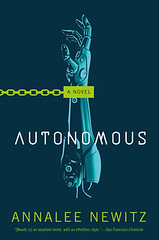 Autonomous
Autonomous
by Annalee Newitz
![]()
I liked “Autonomous” a lot, even though if left me with questions.
Annalee Newitz has created a near-future world profoundly changed by a shift from government to corporate power, mass population relocation, and climate, but the bright young things at the cutting edge of technology are prospering, and all in all it’s rather an exciting world … unless you’re an indentured human or bot.
I wanted to know more about this world than “Autonomous” offered. What we get is just a tiny slice, that occupied by the biohacking/pharma/international-property-rights-enforcement sector. That’s enough, fortunately, to accommodate a good story (for which I refer you to the blurb, above). I had fun reading it.
I wasn’t able to suspend disbelief, though … not the way I always can when I read a William Gibson novel, or one by Neal Stephenson. I kept asking questions.
How did Jack come to own a submarine? Even in the context of the world of “Autonomous,” a sub seems like something only a major corporation would own. If a private citizen has her own, many many other private citizens must have them too, and they’d be bumping into one another. An unspecified event led to the apparent collapse of the United States and there’s been a major population shift to Canada and its Northern Territories, which have become temperate. But if the Great White North is now temperate, wouldn’t the equatorial regions of the world be uninhabitable? I mean, that’s the actual arc our current world is on, no? And yet here is Casablanca, with plenty of water and a burgeoning population of techs and wealthy corporations. Like I said, questions.
And then there’s artificial intelligence. When science fiction writers ask me to believe in AI I want some remotely-possible technology behind it, not some vague “oh, we invented AI fifty years ago and now there are humanoid bots and mechanical robots who can think and act all on their own and I’ll even throw in one of each as major characters.” I accepted these parts of “Autonomous” the same way I’d accept magic in a fantasy novel, but I would much rather have had something I could believe in.
I think the author was attempting something daring with the sexual relationship between Paladin and his/her human partner, which I found interesting but not provocative. I thought something similar was going to happen with the former indentured sex slave Threezed and the female humanoid bot Med, and was vaguely disappointed when it didn’t. Or did it?
Well, I want more of this world, and I hope Annalee Newitz revisits it in a future novel. What I read feels like part of a longer work, something on the order of one of Gibson’s trilogies, and yes I do mean that as a compliment.
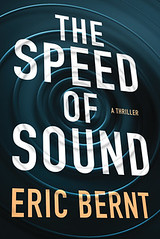 The Speed of Sound (Speed of Sound Thrillers #1)
The Speed of Sound (Speed of Sound Thrillers #1)
by Eric Bernt
![]()
I’ve been in a distracted mood, unable to focus, the result of a series of minor medical procedures and the recovery time after each, so I’ve been reading easy-to-digest thrillers. All very lowbrow, I’m afraid, but even in airport book land, some books are better than others.
I thoroughly enjoyed this thriller-with-a-science-fiction-hook. It’s well written, has engaging characters, and zips from one action scene to another. It’s almost impossible to put down once you start reading, despite the silly sci-fi premise, about which the less said the better.
Well, on second thought I will say a bit about the premise. If you read the book’s blurb, you’ll say “no way.” But two or three chapters in you kind of halfway begin to swallow it, the idea that sound waves keep bouncing around in enclosed spaces and can be retrieved (even decades later). Your acceptance is helped along by the quality of the narration, the speed of the action, and a set of believable villains. In the end, you don’t care that the science fiction hook is a flimsy one.
That’s how I felt, anyway, and you know what? When the sequel comes out next year, I’ll probably read the damned thing.
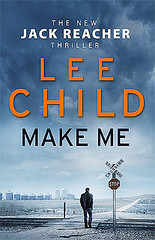 Make Me (Jack Reacher #20)
Make Me (Jack Reacher #20)
by Lee Child
![]()
My 20th Jack Reacher book, and the 20th in the series.
There seems to be more of an evolution in Reacher’s character in this novel than in previous installments. Some reviewers point to his stronger-than-usual attachment to his female co-protagonist, Michelle Chang, but we’ve seen that before. Remember the Army major he traveled cross-country to see over the course of three earlier novels?
No, it’s middle age catching up with Reacher. He suffers a rifle stock blow to the head and this time he doesn’t get over it. It catches up with him a few chapters later. Reacher staggers. Reacher falls down. Reacher is momentarily helpless. Reacher goes to the hospital! Never mind that he gets back up again and dispatches the bad guys, this is a big deal. Age and weakness have been introduced and now I have to read the next one to see what happens.
Oh btw, the bad guys in this one are really awfully horribly no-good nastily bad, and deserve everything Reacher, Chang, and the hogs do to them. Never again will I feel safe or at home in a small midwestern town.
p.s. The Kindle edition I read, and probably other editions as well, contains a standalone short story at the end, this one about a case Reacher worked as a major in the Army, also involving his brother Joe Reacher (whose death was central to the plot of the first Jack Reacher novel, but who appears in later flashback novels). It is an excellent story, probably the outline for an abandoned novel.
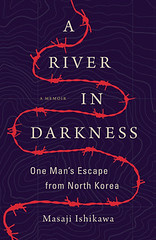 A River in Darkness: One Man’s Escape from North Korea
A River in Darkness: One Man’s Escape from North Korea
by Masaji Ishikawa
![]()
Some historians have claimed that at one point in the 1950s or early 1960s it was anyone’s guess whether North or South Korea was more likely to succeed and provide a better life for its people. This is right about the time Masaji Ishikawa and his family were persuaded to leave Japan, where they were part of an unloved ethnic Korean minority imported as cheap labor before and during WWII, and emigrate to North Korea, where they instantly became part of a hated, persecuted, doomed-to-life-at-the-lowest-rungs-of-society minority.
From the frying pan into the fire. The historians I mentioned were full of it. North Korea under Kim Il Sung was every bit the hellhole it was under Kim Jong Il, and later still, under Kim Jong Un. Ishikawa’s memoir makes George Orwell’s classic dystopian novel “1984” look like a Harry Potter story. It’s the grimmest, most hopeless, grindingly depressing thing I’ve ever read, and knowing what I know of North Korea from other accounts written by people who made it out, Ishikawa’s every word rings true.
I recommend this book to anyone tempted to go gaga over the latest rumors of peace or to uncritically swallow the media campaign to humanize Kim Jong Un. If you want to know how the Kims, the whole cursed clan, really treat their people, read what the escapees have to say. Devastating almost to the point of unbelievability … but as I said earlier, the more you learn about NK, the more you have to believe what Ishikawa has to say here.
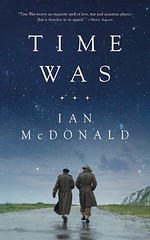 Time Was
Time Was
by Ian McDonald
![]()
I loved McDonald’s “The Dervish House,” “River of Gods,” and “Luna: New Moon.” When I heard of “Time Was,” published this year, I ordered it from the library, surprised to see they had only paperback copies in circulation. Well, no wonder … this is a straight-to-paperback novella, possibly a long short story, perhaps (I’m hoping) the outline of a future novel.
It opens strong; McDonald sets the stage with some of his finest, most lyrical writing. The out-of-business bookstore and the odd collection of scavengers picking over unsold volumes to sell on eBay pulled me in; the mysterious letter found tucked inside a book of poetry offering a vivid glimpse of life on England’s “invasion coast” during the Blitz … this was great stuff.
By the third or fourth chapter the writing became less evocative of times and places, more pedestrian and businesslike. The story was interesting and continued to pull me along, but I was disappointed to spend so little time with Tom and Ben, the two characters the book is nominally about; “Time Was” is far more about the historical hunt for Tom and Ben, who appear in old photos, letters, and movie clips, always at a remove. I got to know the bookseller quite well, but he just wasn’t that interesting … until the end, when he becomes very interesting indeed.
As I said, “Time Was” seems more of an outline than a finished work to me. I enjoyed it, and will come back to it gladly if, in a year or two, it becomes a proper novel.
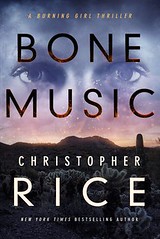 Bone Music (Burning Girl #1)
Bone Music (Burning Girl #1)
by Christopher Rice
![]()
No rating; did not finish.
I wrote these preliminary comments after reading the first four chapters:
“I’m looking at Goodreads reviews of ‘Bone Music’ and am pretty sure someone’s figured out how to game the system: the first seven (!) reviews are five-star raves. If anything, this is a one, one and a half star effort (also an effort to read, with long & tedious dialog chapters between action chapters). I doubt I’ll even finish, but we’ll see. Consider this a placeholder for now.”
I plowed on for another few chapters, making it to the halfway point. “Bone Music” kept getting worse, with not just single dialog chapters between action chapters, but two, then three, then four dialog chapters in a row, chapters in which characters argue about what they’re going to do next. I found myself skipping ahead, first one page at a time, then several at once, looking for someone to finally get around to doing something, anything, my god quit saying the same things over and over already!
The premise (you can quit reading now if you’re going to start whining about spoilers, because my intention is to so spoil this one for you so that you don’t waste a minute actually reading it) is that a 110-pound woman can take a pill and turn into Hulkette for three hours. Okay, I’ll go along with it, I thought to myself, but then she steps onto the interstate and stops a speeding 18-wheeler with her fist. Unless that pill, in addition to giving her super strength, gave her the mass of a 100,000-pound boulder … well, I’d had enough. I won’t even mention the helicopter extending its skids prior to landing because that might be a detail only an aviator would choke on.
It’s crap. I wouldn’t even read this shit in comic book form.